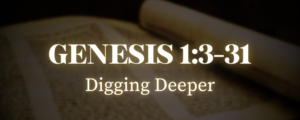Spiritual Warfare and God’s Common Grace
In Genesis 4, God spares and protects Cain even after Cain murders Abel. While this might surprise us, it is clear that God still has purposes even for Cain. A primary reason, God protects Cain is because in his good and sovereign purposes, God would use even Cain’s offspring to bring blessings to humanity. He protects Cain because God uses even the wicked to carry out his plans for the world.
God uses the descendants of this murderer to bring innovations and discoveries and inventions into creation that would benefit all of humanity living in a fallen world.
These innovations come specifically from Cain’s great-great-great grandson Lamech’s line. The sons of Lamech advance discoveries in animal breeding, music, and metal-working (Gen 4:19-22).
- Jabal was the originator of livestock breeding and trading.
- Jubal made great advances in music.
- Tubal-cain was the first black-smith, forging tools and useful items of bronze and iron.
These innovations are obviously not bad things. These are discoveries that we still benefit from today. These innovations would be carried on by Noah and his sons, and God’s people in the Old Testament would benefit from them. Abraham would dwell in tents and raise livestock. David would play the lyre. The Israelites would use bronze in constructing the tabernacle (Ex 27:1-8).
God uses the lineage of Cain, an offspring of Satan, to bring innovations into the world that would bless even God’s people.
This is what theologians call God’s common grace. God’s common grace is his goodness that all people experience. It’s “common” in the sense that it extends to the human race in common. In his common grace, God restrains sin in the world and gives talents and abilities that are used for good, even by those who reject God.
There are two wrong responses to God’s common grace.
The First Wrong Response: Denying God’s Common Grace
Since some of the innovations we benefit from were discovered or advanced by people who reject God, we might wonder if we should reject them. Should we reject good innovations because they were produced by people who deny God?
The answer is no. That would be a wrong response because it denies God’s grace and sovereignty that can produce good even through sinful humanity. God uses even the ungodly to produce helpful discoveries in our fallen world. They are simply learning lessons from patterns God has woven into creation.
Therefore, we can wisely embrace good cultural advances and technological discoveries because we recognize God’s grace and sovereignty in them.
The Second Wrong Response: Presuming Upon God’s Common Grace
Lamech gives us an example of another wrong response to God’s common grace. He boasts to his wives about murdering a man. Lamech looks at God’s mercy to Cain and interprets it as a cover for sin. He thinks he can sin without consequences. He presumes upon God’s grace.
This is an evil response to God’s grace. The fact that God uses even the wicked to accomplish good things doesn’t mean that he will not judge their sin or that he condones their actions. Worldly blessings are no sign that God is pleased with you. His common grace is no cover for sin.
God retains complete control over this world. His common grace even to the wicked is not a sign that evil is winning! It’s actually a sign that the battle is the Lord’s.
Where the Battle is Waged
We should give thanks to God for his common grace that even our enemies experience. We shouldn’t be troubled by the reality that God-rejecters are at the forefront of many innovations in our world.1 That is not a sign that God’s people are losing the battle.
Part of the point here in Genesis 4 is that the spiritual battle is not won or lost based on earthly accomplishments and innovations. No, the battle is waged by living by faith in God’s promises no matter what.
The spiritual battle we face isn’t won or lost by achieving success in this world.
Cain’s sons may have had the innovations and discoveries. But the sons of Seth show us what matters most: calling upon the name of the LORD (Gen 4:26).
Cain may have had a longer life on earth, but Abel shows us who will win the battle: the Shepherd who offered a better sacrifice and was slain for his people.
Therefore, while the battle still rages around us, we persevere in our faith that Christ has won the victory, and his blood speaks a better word of mercy and grace for all who call upon his Name.
- “In his wisdom, God chooses to send the most powerful ideas and innovations into this world mostly through God rejectors, through agnostics and atheists and deists who hold to some appearance of religion (like Cain did in his offering). But for whatever reason, God has chosen to not send many technological advances through his bride, the church. Spiritual awakening and innovative prowess, both the work of God’s Spirit, are rarely tied together in the economy of God’s plan.” Tony Reinke, God, Technology, and the Christian Life, p. 137. ↩︎
This post was adapted from the sermon below:










